Entrepreneurship: Types, Impact, and Entrepreneurial Aspects Report
VerifiedAdded on 2021/01/02
|17
|5186
|402
Report
AI Summary
This report delves into the multifaceted world of entrepreneurship and small business management. It begins by defining entrepreneurship and its role in generating revenue and profit, then explores different types of entrepreneurial ventures, including small businesses, large companies, and social enterprises, along with their respective characteristics and operational scales. The report then examines various business typologies, such as lifestyle enterprises and growth firms, and their relationship to entrepreneurial ventures. A significant portion is dedicated to analyzing the impact of small and micro businesses on the economy, discussing their local, regional, and national contributions, supported by relevant statistics. The report further identifies and contrasts the characteristics, skills, and traits that differentiate entrepreneurs from business managers, assessing how these aspects reflect their mindset and motivation. Finally, it explores how the background and experience of entrepreneurs can either foster or hinder their entrepreneurial endeavors, concluding with a comprehensive overview of the key takeaways and findings related to the subject matter.

ENTREPRENEURSHIP AND
SMALL BUSINESS
MANAGEMENT
SMALL BUSINESS
MANAGEMENT
Paraphrase This Document
Need a fresh take? Get an instant paraphrase of this document with our AI Paraphraser
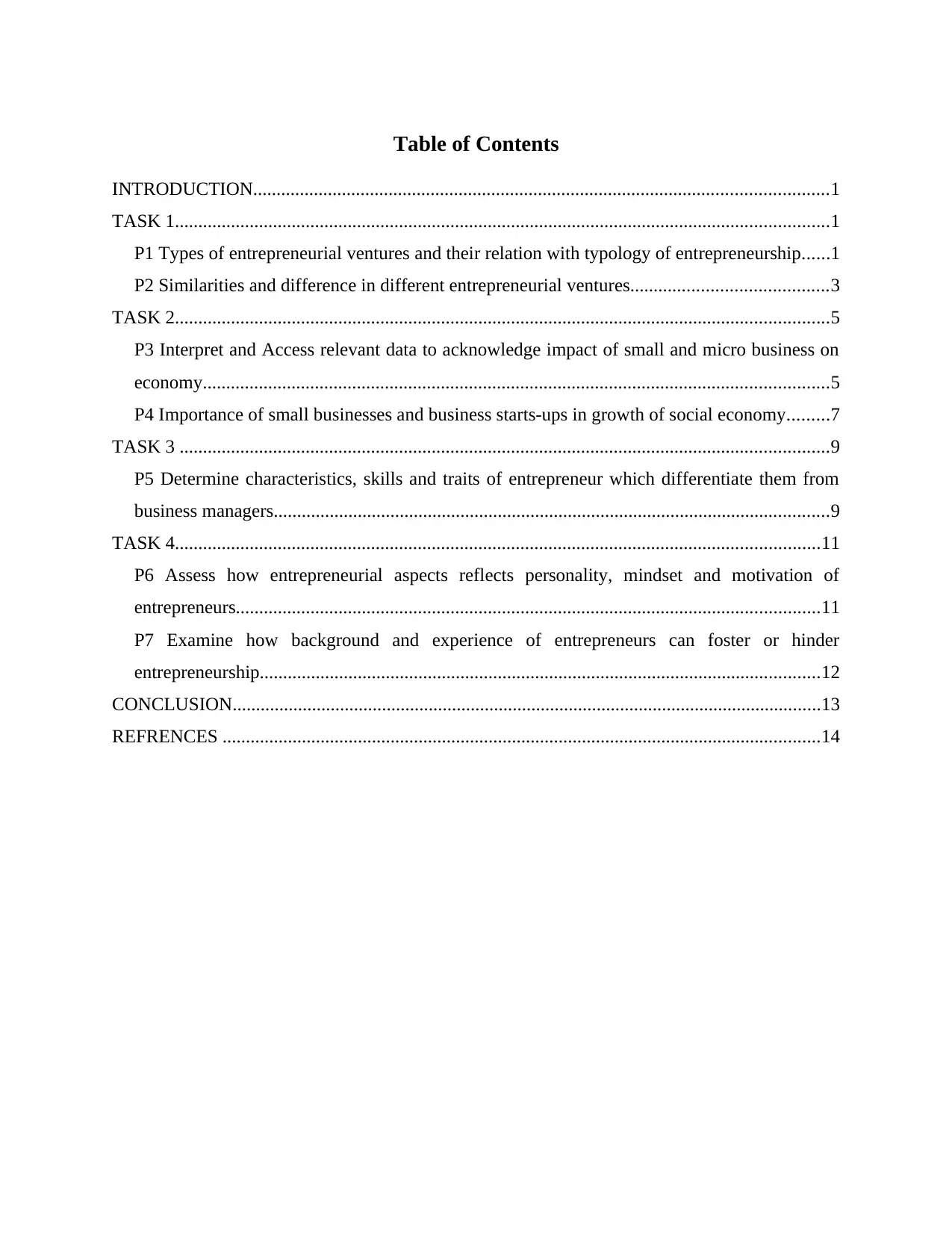
Table of Contents
INTRODUCTION...........................................................................................................................1
TASK 1............................................................................................................................................1
P1 Types of entrepreneurial ventures and their relation with typology of entrepreneurship......1
P2 Similarities and difference in different entrepreneurial ventures..........................................3
TASK 2............................................................................................................................................5
P3 Interpret and Access relevant data to acknowledge impact of small and micro business on
economy......................................................................................................................................5
P4 Importance of small businesses and business starts-ups in growth of social economy.........7
TASK 3 ...........................................................................................................................................9
P5 Determine characteristics, skills and traits of entrepreneur which differentiate them from
business managers.......................................................................................................................9
TASK 4..........................................................................................................................................11
P6 Assess how entrepreneurial aspects reflects personality, mindset and motivation of
entrepreneurs.............................................................................................................................11
P7 Examine how background and experience of entrepreneurs can foster or hinder
entrepreneurship........................................................................................................................12
CONCLUSION..............................................................................................................................13
REFRENCES ................................................................................................................................14
INTRODUCTION...........................................................................................................................1
TASK 1............................................................................................................................................1
P1 Types of entrepreneurial ventures and their relation with typology of entrepreneurship......1
P2 Similarities and difference in different entrepreneurial ventures..........................................3
TASK 2............................................................................................................................................5
P3 Interpret and Access relevant data to acknowledge impact of small and micro business on
economy......................................................................................................................................5
P4 Importance of small businesses and business starts-ups in growth of social economy.........7
TASK 3 ...........................................................................................................................................9
P5 Determine characteristics, skills and traits of entrepreneur which differentiate them from
business managers.......................................................................................................................9
TASK 4..........................................................................................................................................11
P6 Assess how entrepreneurial aspects reflects personality, mindset and motivation of
entrepreneurs.............................................................................................................................11
P7 Examine how background and experience of entrepreneurs can foster or hinder
entrepreneurship........................................................................................................................12
CONCLUSION..............................................................................................................................13
REFRENCES ................................................................................................................................14
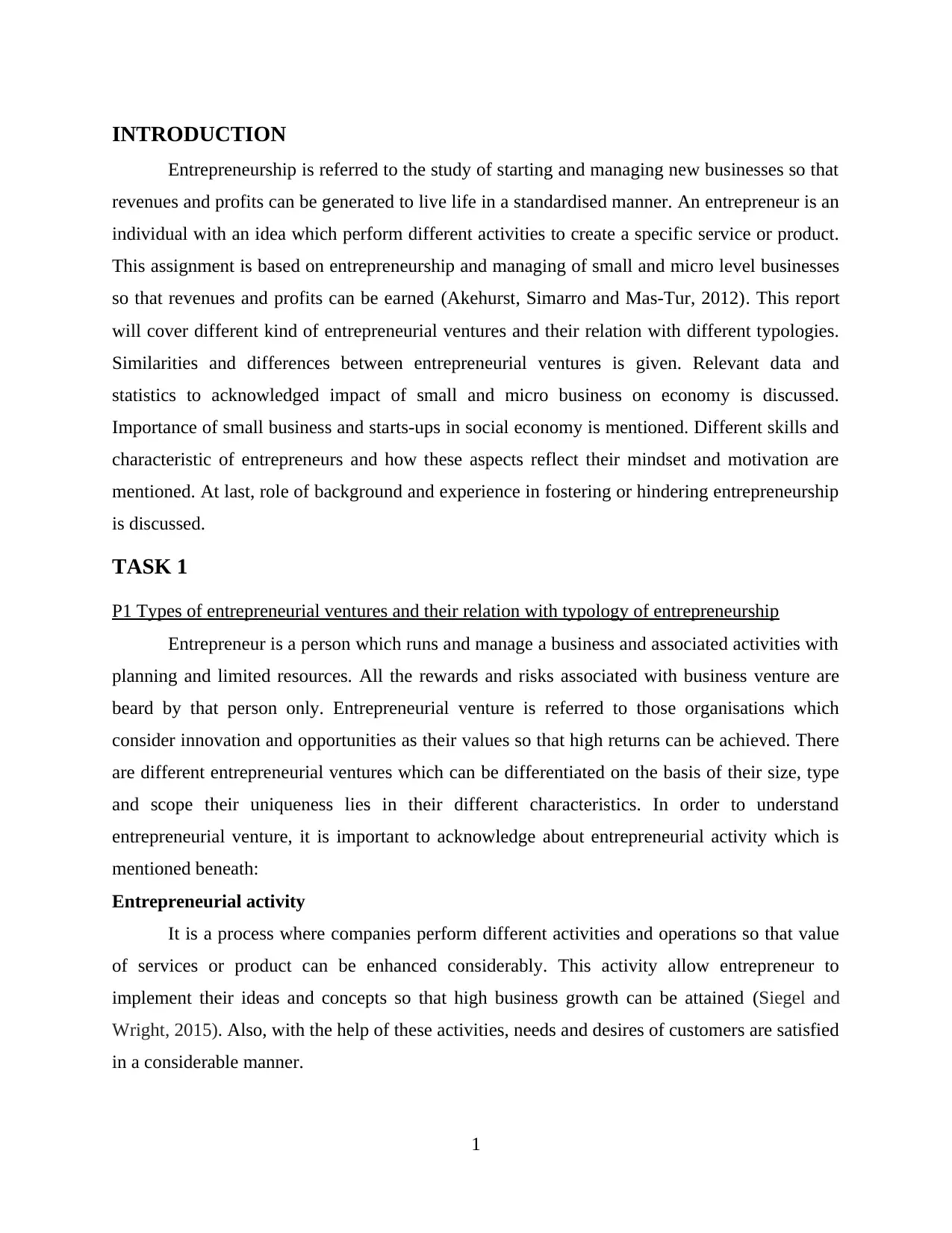
INTRODUCTION
Entrepreneurship is referred to the study of starting and managing new businesses so that
revenues and profits can be generated to live life in a standardised manner. An entrepreneur is an
individual with an idea which perform different activities to create a specific service or product.
This assignment is based on entrepreneurship and managing of small and micro level businesses
so that revenues and profits can be earned (Akehurst, Simarro and Mas‐Tur, 2012). This report
will cover different kind of entrepreneurial ventures and their relation with different typologies.
Similarities and differences between entrepreneurial ventures is given. Relevant data and
statistics to acknowledged impact of small and micro business on economy is discussed.
Importance of small business and starts-ups in social economy is mentioned. Different skills and
characteristic of entrepreneurs and how these aspects reflect their mindset and motivation are
mentioned. At last, role of background and experience in fostering or hindering entrepreneurship
is discussed.
TASK 1
P1 Types of entrepreneurial ventures and their relation with typology of entrepreneurship
Entrepreneur is a person which runs and manage a business and associated activities with
planning and limited resources. All the rewards and risks associated with business venture are
beard by that person only. Entrepreneurial venture is referred to those organisations which
consider innovation and opportunities as their values so that high returns can be achieved. There
are different entrepreneurial ventures which can be differentiated on the basis of their size, type
and scope their uniqueness lies in their different characteristics. In order to understand
entrepreneurial venture, it is important to acknowledge about entrepreneurial activity which is
mentioned beneath:
Entrepreneurial activity
It is a process where companies perform different activities and operations so that value
of services or product can be enhanced considerably. This activity allow entrepreneur to
implement their ideas and concepts so that high business growth can be attained (Siegel and
Wright, 2015). Also, with the help of these activities, needs and desires of customers are satisfied
in a considerable manner.
1
Entrepreneurship is referred to the study of starting and managing new businesses so that
revenues and profits can be generated to live life in a standardised manner. An entrepreneur is an
individual with an idea which perform different activities to create a specific service or product.
This assignment is based on entrepreneurship and managing of small and micro level businesses
so that revenues and profits can be earned (Akehurst, Simarro and Mas‐Tur, 2012). This report
will cover different kind of entrepreneurial ventures and their relation with different typologies.
Similarities and differences between entrepreneurial ventures is given. Relevant data and
statistics to acknowledged impact of small and micro business on economy is discussed.
Importance of small business and starts-ups in social economy is mentioned. Different skills and
characteristic of entrepreneurs and how these aspects reflect their mindset and motivation are
mentioned. At last, role of background and experience in fostering or hindering entrepreneurship
is discussed.
TASK 1
P1 Types of entrepreneurial ventures and their relation with typology of entrepreneurship
Entrepreneur is a person which runs and manage a business and associated activities with
planning and limited resources. All the rewards and risks associated with business venture are
beard by that person only. Entrepreneurial venture is referred to those organisations which
consider innovation and opportunities as their values so that high returns can be achieved. There
are different entrepreneurial ventures which can be differentiated on the basis of their size, type
and scope their uniqueness lies in their different characteristics. In order to understand
entrepreneurial venture, it is important to acknowledge about entrepreneurial activity which is
mentioned beneath:
Entrepreneurial activity
It is a process where companies perform different activities and operations so that value
of services or product can be enhanced considerably. This activity allow entrepreneur to
implement their ideas and concepts so that high business growth can be attained (Siegel and
Wright, 2015). Also, with the help of these activities, needs and desires of customers are satisfied
in a considerable manner.
1
⊘ This is a preview!⊘
Do you want full access?
Subscribe today to unlock all pages.

Trusted by 1+ million students worldwide
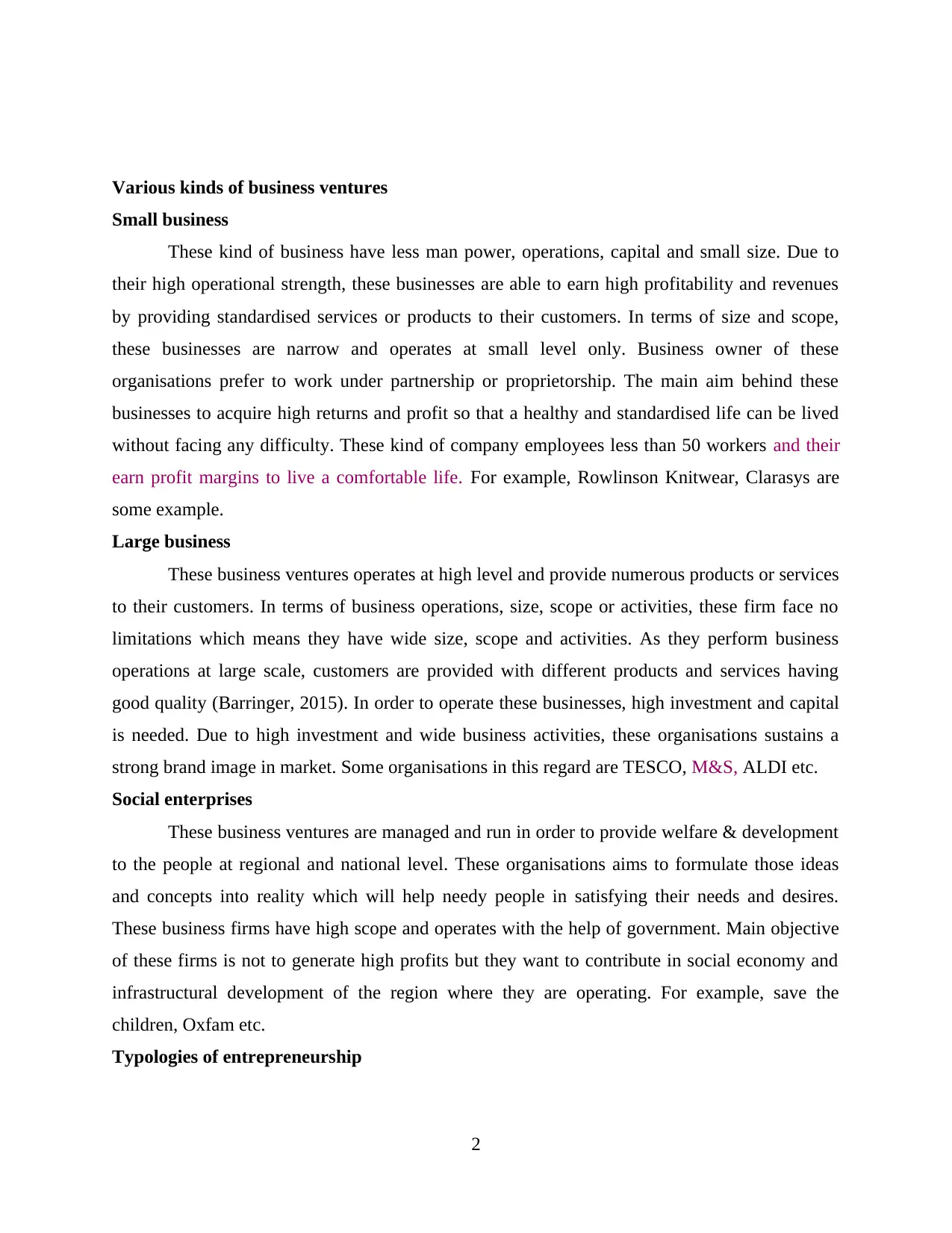
Various kinds of business ventures
Small business
These kind of business have less man power, operations, capital and small size. Due to
their high operational strength, these businesses are able to earn high profitability and revenues
by providing standardised services or products to their customers. In terms of size and scope,
these businesses are narrow and operates at small level only. Business owner of these
organisations prefer to work under partnership or proprietorship. The main aim behind these
businesses to acquire high returns and profit so that a healthy and standardised life can be lived
without facing any difficulty. These kind of company employees less than 50 workers and their
earn profit margins to live a comfortable life. For example, Rowlinson Knitwear, Clarasys are
some example.
Large business
These business ventures operates at high level and provide numerous products or services
to their customers. In terms of business operations, size, scope or activities, these firm face no
limitations which means they have wide size, scope and activities. As they perform business
operations at large scale, customers are provided with different products and services having
good quality (Barringer, 2015). In order to operate these businesses, high investment and capital
is needed. Due to high investment and wide business activities, these organisations sustains a
strong brand image in market. Some organisations in this regard are TESCO, M&S, ALDI etc.
Social enterprises
These business ventures are managed and run in order to provide welfare & development
to the people at regional and national level. These organisations aims to formulate those ideas
and concepts into reality which will help needy people in satisfying their needs and desires.
These business firms have high scope and operates with the help of government. Main objective
of these firms is not to generate high profits but they want to contribute in social economy and
infrastructural development of the region where they are operating. For example, save the
children, Oxfam etc.
Typologies of entrepreneurship
2
Small business
These kind of business have less man power, operations, capital and small size. Due to
their high operational strength, these businesses are able to earn high profitability and revenues
by providing standardised services or products to their customers. In terms of size and scope,
these businesses are narrow and operates at small level only. Business owner of these
organisations prefer to work under partnership or proprietorship. The main aim behind these
businesses to acquire high returns and profit so that a healthy and standardised life can be lived
without facing any difficulty. These kind of company employees less than 50 workers and their
earn profit margins to live a comfortable life. For example, Rowlinson Knitwear, Clarasys are
some example.
Large business
These business ventures operates at high level and provide numerous products or services
to their customers. In terms of business operations, size, scope or activities, these firm face no
limitations which means they have wide size, scope and activities. As they perform business
operations at large scale, customers are provided with different products and services having
good quality (Barringer, 2015). In order to operate these businesses, high investment and capital
is needed. Due to high investment and wide business activities, these organisations sustains a
strong brand image in market. Some organisations in this regard are TESCO, M&S, ALDI etc.
Social enterprises
These business ventures are managed and run in order to provide welfare & development
to the people at regional and national level. These organisations aims to formulate those ideas
and concepts into reality which will help needy people in satisfying their needs and desires.
These business firms have high scope and operates with the help of government. Main objective
of these firms is not to generate high profits but they want to contribute in social economy and
infrastructural development of the region where they are operating. For example, save the
children, Oxfam etc.
Typologies of entrepreneurship
2
Paraphrase This Document
Need a fresh take? Get an instant paraphrase of this document with our AI Paraphraser
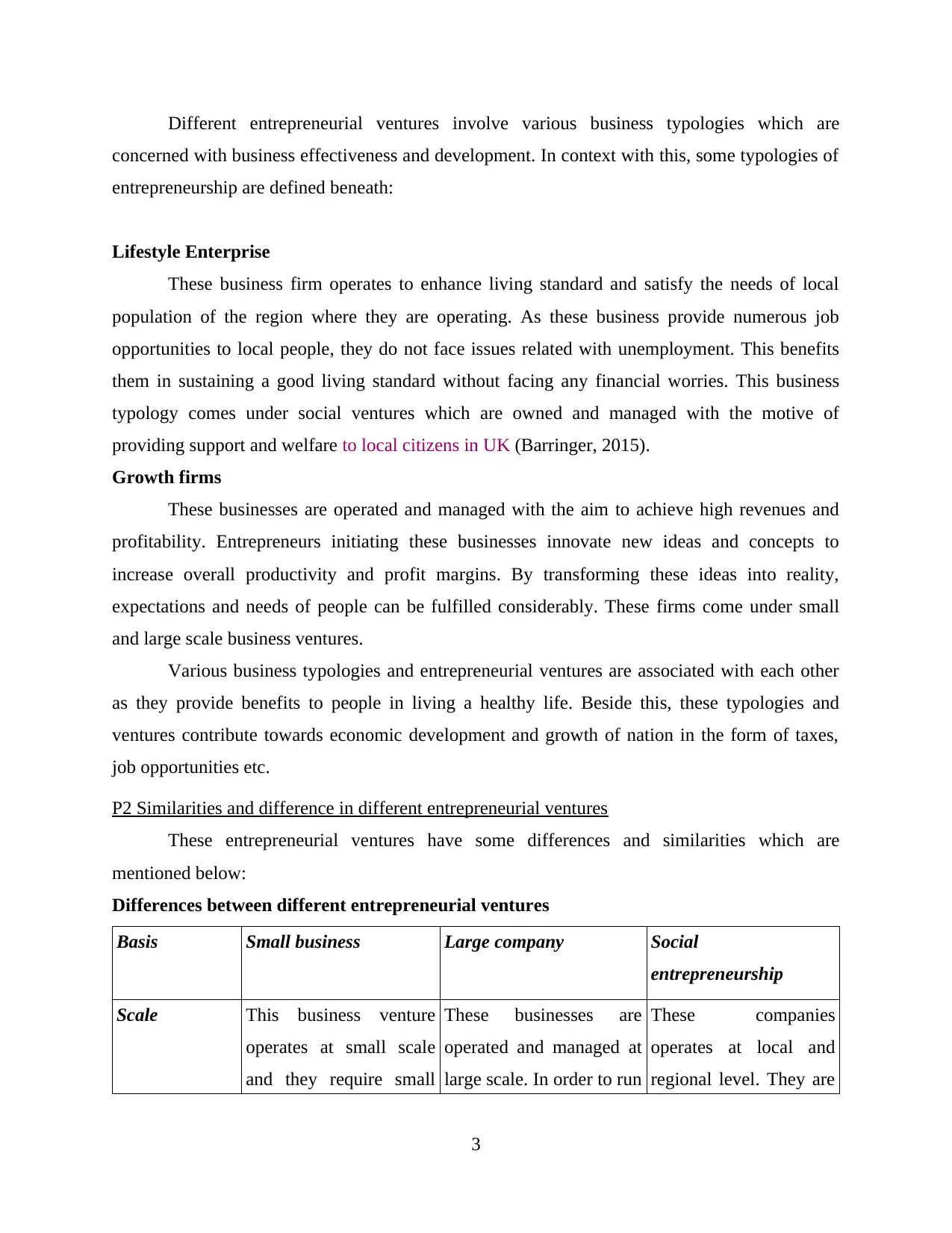
Different entrepreneurial ventures involve various business typologies which are
concerned with business effectiveness and development. In context with this, some typologies of
entrepreneurship are defined beneath:
Lifestyle Enterprise
These business firm operates to enhance living standard and satisfy the needs of local
population of the region where they are operating. As these business provide numerous job
opportunities to local people, they do not face issues related with unemployment. This benefits
them in sustaining a good living standard without facing any financial worries. This business
typology comes under social ventures which are owned and managed with the motive of
providing support and welfare to local citizens in UK (Barringer, 2015).
Growth firms
These businesses are operated and managed with the aim to achieve high revenues and
profitability. Entrepreneurs initiating these businesses innovate new ideas and concepts to
increase overall productivity and profit margins. By transforming these ideas into reality,
expectations and needs of people can be fulfilled considerably. These firms come under small
and large scale business ventures.
Various business typologies and entrepreneurial ventures are associated with each other
as they provide benefits to people in living a healthy life. Beside this, these typologies and
ventures contribute towards economic development and growth of nation in the form of taxes,
job opportunities etc.
P2 Similarities and difference in different entrepreneurial ventures
These entrepreneurial ventures have some differences and similarities which are
mentioned below:
Differences between different entrepreneurial ventures
Basis Small business Large company Social
entrepreneurship
Scale This business venture
operates at small scale
and they require small
These businesses are
operated and managed at
large scale. In order to run
These companies
operates at local and
regional level. They are
3
concerned with business effectiveness and development. In context with this, some typologies of
entrepreneurship are defined beneath:
Lifestyle Enterprise
These business firm operates to enhance living standard and satisfy the needs of local
population of the region where they are operating. As these business provide numerous job
opportunities to local people, they do not face issues related with unemployment. This benefits
them in sustaining a good living standard without facing any financial worries. This business
typology comes under social ventures which are owned and managed with the motive of
providing support and welfare to local citizens in UK (Barringer, 2015).
Growth firms
These businesses are operated and managed with the aim to achieve high revenues and
profitability. Entrepreneurs initiating these businesses innovate new ideas and concepts to
increase overall productivity and profit margins. By transforming these ideas into reality,
expectations and needs of people can be fulfilled considerably. These firms come under small
and large scale business ventures.
Various business typologies and entrepreneurial ventures are associated with each other
as they provide benefits to people in living a healthy life. Beside this, these typologies and
ventures contribute towards economic development and growth of nation in the form of taxes,
job opportunities etc.
P2 Similarities and difference in different entrepreneurial ventures
These entrepreneurial ventures have some differences and similarities which are
mentioned below:
Differences between different entrepreneurial ventures
Basis Small business Large company Social
entrepreneurship
Scale This business venture
operates at small scale
and they require small
These businesses are
operated and managed at
large scale. In order to run
These companies
operates at local and
regional level. They are
3
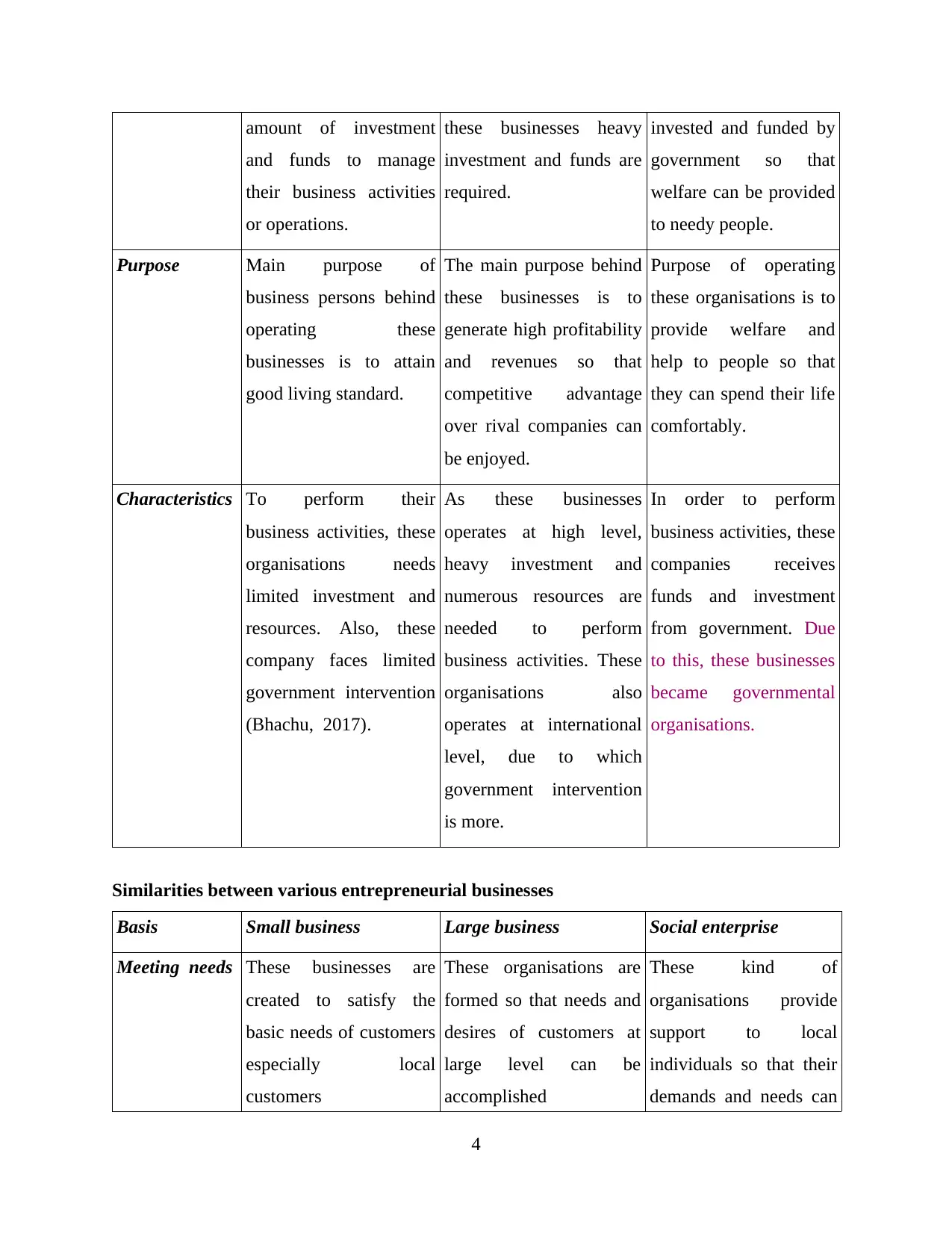
amount of investment
and funds to manage
their business activities
or operations.
these businesses heavy
investment and funds are
required.
invested and funded by
government so that
welfare can be provided
to needy people.
Purpose Main purpose of
business persons behind
operating these
businesses is to attain
good living standard.
The main purpose behind
these businesses is to
generate high profitability
and revenues so that
competitive advantage
over rival companies can
be enjoyed.
Purpose of operating
these organisations is to
provide welfare and
help to people so that
they can spend their life
comfortably.
Characteristics To perform their
business activities, these
organisations needs
limited investment and
resources. Also, these
company faces limited
government intervention
(Bhachu, 2017).
As these businesses
operates at high level,
heavy investment and
numerous resources are
needed to perform
business activities. These
organisations also
operates at international
level, due to which
government intervention
is more.
In order to perform
business activities, these
companies receives
funds and investment
from government. Due
to this, these businesses
became governmental
organisations.
Similarities between various entrepreneurial businesses
Basis Small business Large business Social enterprise
Meeting needs These businesses are
created to satisfy the
basic needs of customers
especially local
customers
These organisations are
formed so that needs and
desires of customers at
large level can be
accomplished
These kind of
organisations provide
support to local
individuals so that their
demands and needs can
4
and funds to manage
their business activities
or operations.
these businesses heavy
investment and funds are
required.
invested and funded by
government so that
welfare can be provided
to needy people.
Purpose Main purpose of
business persons behind
operating these
businesses is to attain
good living standard.
The main purpose behind
these businesses is to
generate high profitability
and revenues so that
competitive advantage
over rival companies can
be enjoyed.
Purpose of operating
these organisations is to
provide welfare and
help to people so that
they can spend their life
comfortably.
Characteristics To perform their
business activities, these
organisations needs
limited investment and
resources. Also, these
company faces limited
government intervention
(Bhachu, 2017).
As these businesses
operates at high level,
heavy investment and
numerous resources are
needed to perform
business activities. These
organisations also
operates at international
level, due to which
government intervention
is more.
In order to perform
business activities, these
companies receives
funds and investment
from government. Due
to this, these businesses
became governmental
organisations.
Similarities between various entrepreneurial businesses
Basis Small business Large business Social enterprise
Meeting needs These businesses are
created to satisfy the
basic needs of customers
especially local
customers
These organisations are
formed so that needs and
desires of customers at
large level can be
accomplished
These kind of
organisations provide
support to local
individuals so that their
demands and needs can
4
⊘ This is a preview!⊘
Do you want full access?
Subscribe today to unlock all pages.

Trusted by 1+ million students worldwide
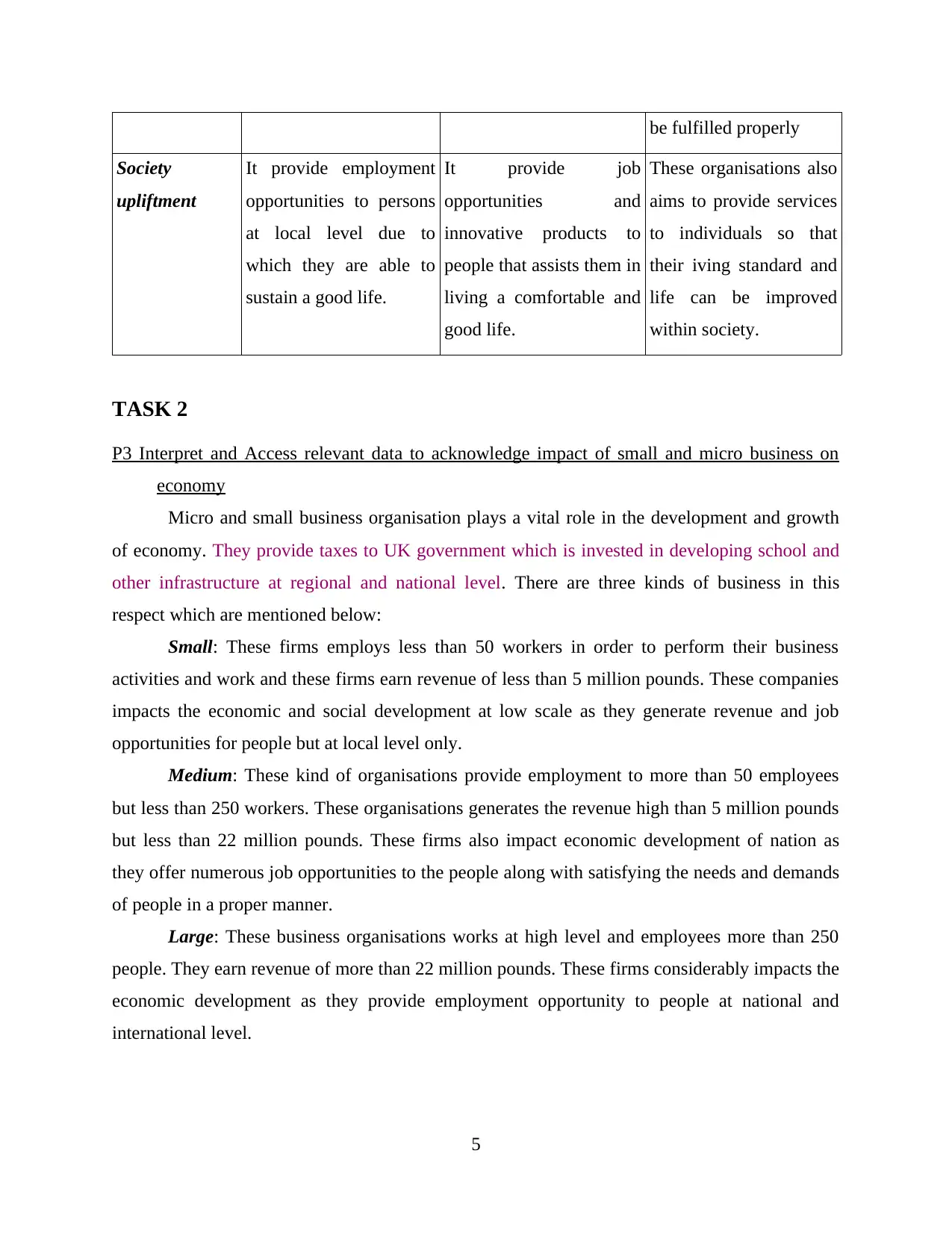
be fulfilled properly
Society
upliftment
It provide employment
opportunities to persons
at local level due to
which they are able to
sustain a good life.
It provide job
opportunities and
innovative products to
people that assists them in
living a comfortable and
good life.
These organisations also
aims to provide services
to individuals so that
their iving standard and
life can be improved
within society.
TASK 2
P3 Interpret and Access relevant data to acknowledge impact of small and micro business on
economy
Micro and small business organisation plays a vital role in the development and growth
of economy. They provide taxes to UK government which is invested in developing school and
other infrastructure at regional and national level. There are three kinds of business in this
respect which are mentioned below:
Small: These firms employs less than 50 workers in order to perform their business
activities and work and these firms earn revenue of less than 5 million pounds. These companies
impacts the economic and social development at low scale as they generate revenue and job
opportunities for people but at local level only.
Medium: These kind of organisations provide employment to more than 50 employees
but less than 250 workers. These organisations generates the revenue high than 5 million pounds
but less than 22 million pounds. These firms also impact economic development of nation as
they offer numerous job opportunities to the people along with satisfying the needs and demands
of people in a proper manner.
Large: These business organisations works at high level and employees more than 250
people. They earn revenue of more than 22 million pounds. These firms considerably impacts the
economic development as they provide employment opportunity to people at national and
international level.
5
Society
upliftment
It provide employment
opportunities to persons
at local level due to
which they are able to
sustain a good life.
It provide job
opportunities and
innovative products to
people that assists them in
living a comfortable and
good life.
These organisations also
aims to provide services
to individuals so that
their iving standard and
life can be improved
within society.
TASK 2
P3 Interpret and Access relevant data to acknowledge impact of small and micro business on
economy
Micro and small business organisation plays a vital role in the development and growth
of economy. They provide taxes to UK government which is invested in developing school and
other infrastructure at regional and national level. There are three kinds of business in this
respect which are mentioned below:
Small: These firms employs less than 50 workers in order to perform their business
activities and work and these firms earn revenue of less than 5 million pounds. These companies
impacts the economic and social development at low scale as they generate revenue and job
opportunities for people but at local level only.
Medium: These kind of organisations provide employment to more than 50 employees
but less than 250 workers. These organisations generates the revenue high than 5 million pounds
but less than 22 million pounds. These firms also impact economic development of nation as
they offer numerous job opportunities to the people along with satisfying the needs and demands
of people in a proper manner.
Large: These business organisations works at high level and employees more than 250
people. They earn revenue of more than 22 million pounds. These firms considerably impacts the
economic development as they provide employment opportunity to people at national and
international level.
5
Paraphrase This Document
Need a fresh take? Get an instant paraphrase of this document with our AI Paraphraser
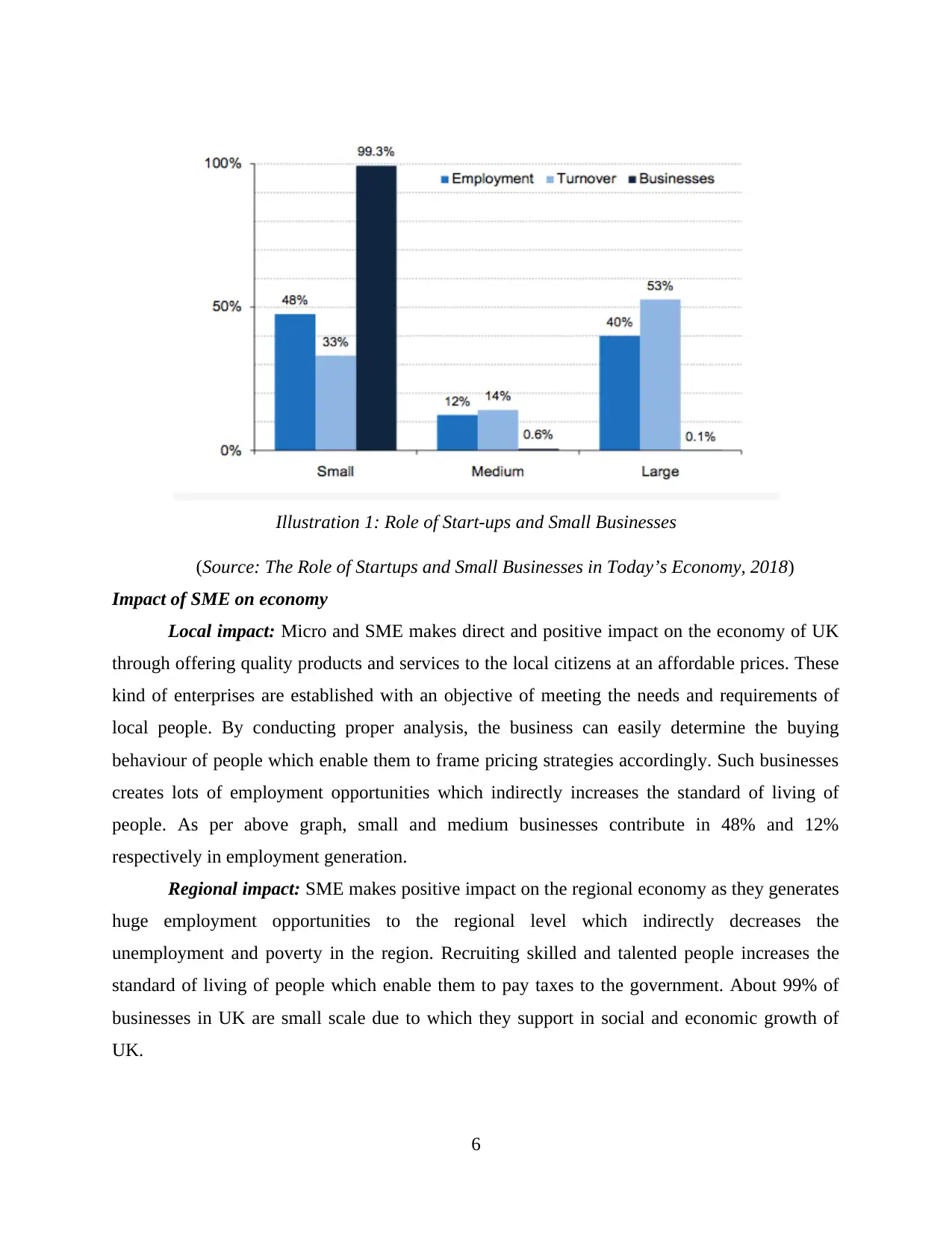
(Source: The Role of Startups and Small Businesses in Today’s Economy, 2018)
Impact of SME on economy
Local impact: Micro and SME makes direct and positive impact on the economy of UK
through offering quality products and services to the local citizens at an affordable prices. These
kind of enterprises are established with an objective of meeting the needs and requirements of
local people. By conducting proper analysis, the business can easily determine the buying
behaviour of people which enable them to frame pricing strategies accordingly. Such businesses
creates lots of employment opportunities which indirectly increases the standard of living of
people. As per above graph, small and medium businesses contribute in 48% and 12%
respectively in employment generation.
Regional impact: SME makes positive impact on the regional economy as they generates
huge employment opportunities to the regional level which indirectly decreases the
unemployment and poverty in the region. Recruiting skilled and talented people increases the
standard of living of people which enable them to pay taxes to the government. About 99% of
businesses in UK are small scale due to which they support in social and economic growth of
UK.
6
Illustration 1: Role of Start-ups and Small Businesses
Impact of SME on economy
Local impact: Micro and SME makes direct and positive impact on the economy of UK
through offering quality products and services to the local citizens at an affordable prices. These
kind of enterprises are established with an objective of meeting the needs and requirements of
local people. By conducting proper analysis, the business can easily determine the buying
behaviour of people which enable them to frame pricing strategies accordingly. Such businesses
creates lots of employment opportunities which indirectly increases the standard of living of
people. As per above graph, small and medium businesses contribute in 48% and 12%
respectively in employment generation.
Regional impact: SME makes positive impact on the regional economy as they generates
huge employment opportunities to the regional level which indirectly decreases the
unemployment and poverty in the region. Recruiting skilled and talented people increases the
standard of living of people which enable them to pay taxes to the government. About 99% of
businesses in UK are small scale due to which they support in social and economic growth of
UK.
6
Illustration 1: Role of Start-ups and Small Businesses
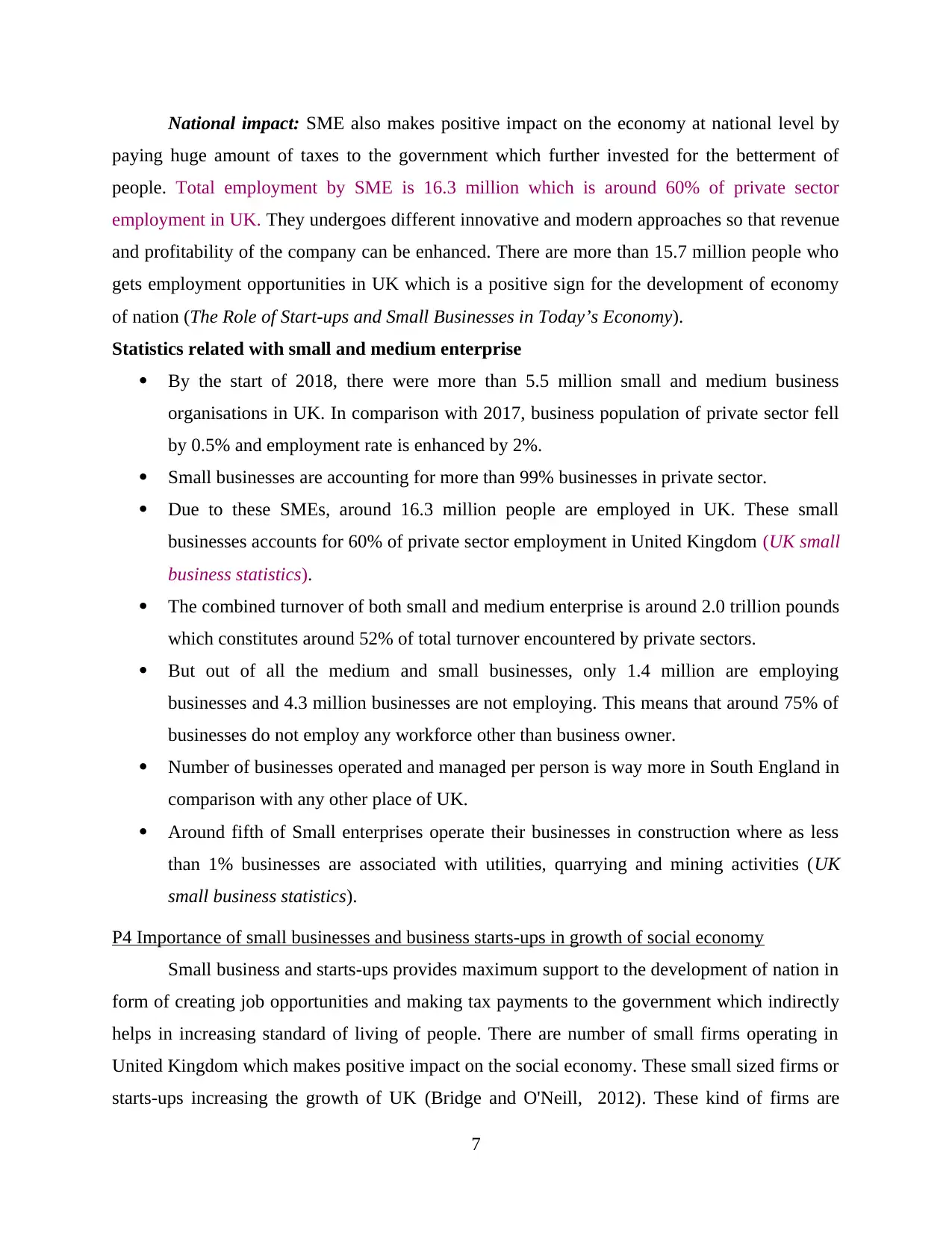
National impact: SME also makes positive impact on the economy at national level by
paying huge amount of taxes to the government which further invested for the betterment of
people. Total employment by SME is 16.3 million which is around 60% of private sector
employment in UK. They undergoes different innovative and modern approaches so that revenue
and profitability of the company can be enhanced. There are more than 15.7 million people who
gets employment opportunities in UK which is a positive sign for the development of economy
of nation (The Role of Start-ups and Small Businesses in Today’s Economy).
Statistics related with small and medium enterprise
By the start of 2018, there were more than 5.5 million small and medium business
organisations in UK. In comparison with 2017, business population of private sector fell
by 0.5% and employment rate is enhanced by 2%.
Small businesses are accounting for more than 99% businesses in private sector.
Due to these SMEs, around 16.3 million people are employed in UK. These small
businesses accounts for 60% of private sector employment in United Kingdom (UK small
business statistics).
The combined turnover of both small and medium enterprise is around 2.0 trillion pounds
which constitutes around 52% of total turnover encountered by private sectors.
But out of all the medium and small businesses, only 1.4 million are employing
businesses and 4.3 million businesses are not employing. This means that around 75% of
businesses do not employ any workforce other than business owner.
Number of businesses operated and managed per person is way more in South England in
comparison with any other place of UK.
Around fifth of Small enterprises operate their businesses in construction where as less
than 1% businesses are associated with utilities, quarrying and mining activities (UK
small business statistics).
P4 Importance of small businesses and business starts-ups in growth of social economy
Small business and starts-ups provides maximum support to the development of nation in
form of creating job opportunities and making tax payments to the government which indirectly
helps in increasing standard of living of people. There are number of small firms operating in
United Kingdom which makes positive impact on the social economy. These small sized firms or
starts-ups increasing the growth of UK (Bridge and O'Neill, 2012). These kind of firms are
7
paying huge amount of taxes to the government which further invested for the betterment of
people. Total employment by SME is 16.3 million which is around 60% of private sector
employment in UK. They undergoes different innovative and modern approaches so that revenue
and profitability of the company can be enhanced. There are more than 15.7 million people who
gets employment opportunities in UK which is a positive sign for the development of economy
of nation (The Role of Start-ups and Small Businesses in Today’s Economy).
Statistics related with small and medium enterprise
By the start of 2018, there were more than 5.5 million small and medium business
organisations in UK. In comparison with 2017, business population of private sector fell
by 0.5% and employment rate is enhanced by 2%.
Small businesses are accounting for more than 99% businesses in private sector.
Due to these SMEs, around 16.3 million people are employed in UK. These small
businesses accounts for 60% of private sector employment in United Kingdom (UK small
business statistics).
The combined turnover of both small and medium enterprise is around 2.0 trillion pounds
which constitutes around 52% of total turnover encountered by private sectors.
But out of all the medium and small businesses, only 1.4 million are employing
businesses and 4.3 million businesses are not employing. This means that around 75% of
businesses do not employ any workforce other than business owner.
Number of businesses operated and managed per person is way more in South England in
comparison with any other place of UK.
Around fifth of Small enterprises operate their businesses in construction where as less
than 1% businesses are associated with utilities, quarrying and mining activities (UK
small business statistics).
P4 Importance of small businesses and business starts-ups in growth of social economy
Small business and starts-ups provides maximum support to the development of nation in
form of creating job opportunities and making tax payments to the government which indirectly
helps in increasing standard of living of people. There are number of small firms operating in
United Kingdom which makes positive impact on the social economy. These small sized firms or
starts-ups increasing the growth of UK (Bridge and O'Neill, 2012). These kind of firms are
7
⊘ This is a preview!⊘
Do you want full access?
Subscribe today to unlock all pages.

Trusted by 1+ million students worldwide
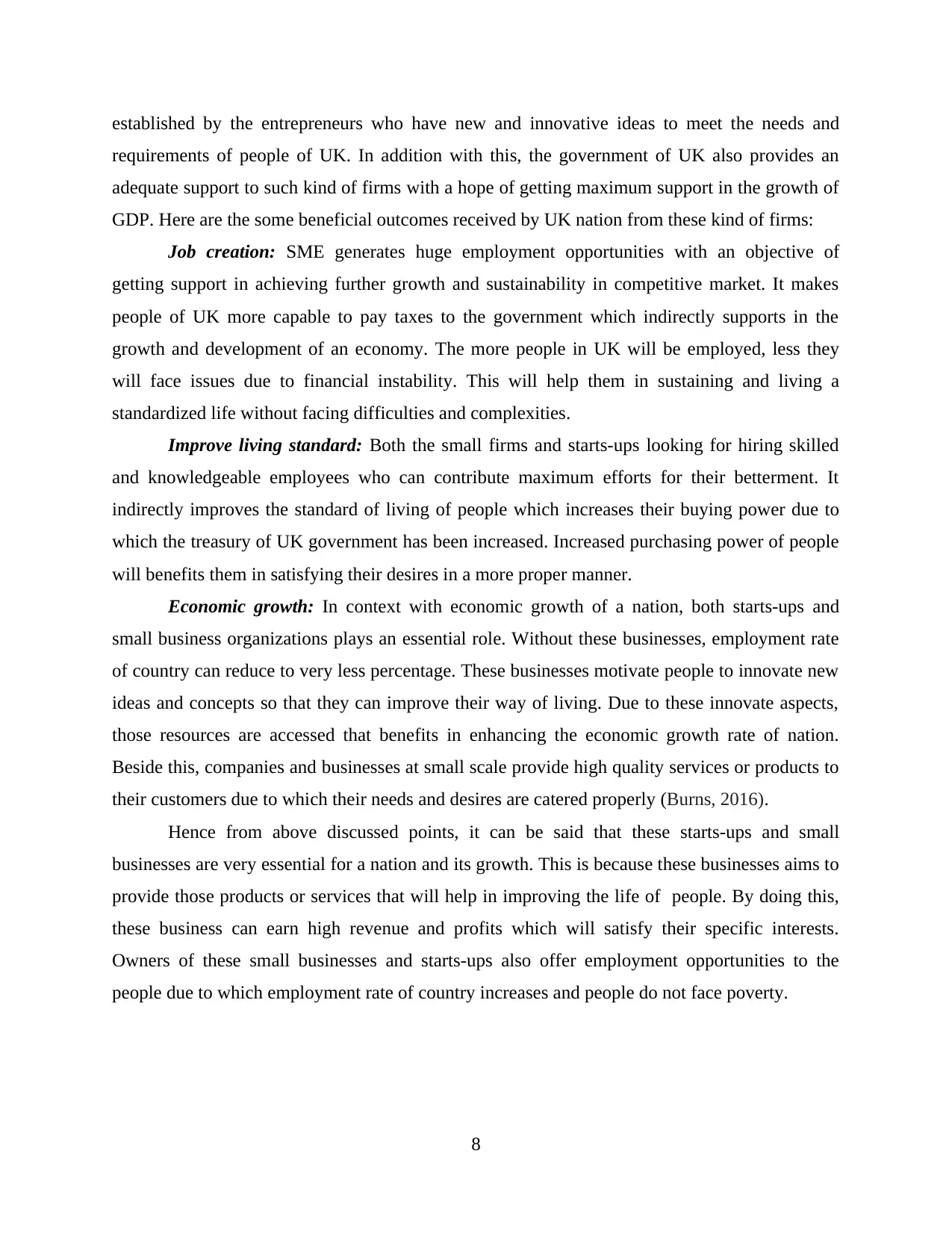
established by the entrepreneurs who have new and innovative ideas to meet the needs and
requirements of people of UK. In addition with this, the government of UK also provides an
adequate support to such kind of firms with a hope of getting maximum support in the growth of
GDP. Here are the some beneficial outcomes received by UK nation from these kind of firms:
Job creation: SME generates huge employment opportunities with an objective of
getting support in achieving further growth and sustainability in competitive market. It makes
people of UK more capable to pay taxes to the government which indirectly supports in the
growth and development of an economy. The more people in UK will be employed, less they
will face issues due to financial instability. This will help them in sustaining and living a
standardized life without facing difficulties and complexities.
Improve living standard: Both the small firms and starts-ups looking for hiring skilled
and knowledgeable employees who can contribute maximum efforts for their betterment. It
indirectly improves the standard of living of people which increases their buying power due to
which the treasury of UK government has been increased. Increased purchasing power of people
will benefits them in satisfying their desires in a more proper manner.
Economic growth: In context with economic growth of a nation, both starts-ups and
small business organizations plays an essential role. Without these businesses, employment rate
of country can reduce to very less percentage. These businesses motivate people to innovate new
ideas and concepts so that they can improve their way of living. Due to these innovate aspects,
those resources are accessed that benefits in enhancing the economic growth rate of nation.
Beside this, companies and businesses at small scale provide high quality services or products to
their customers due to which their needs and desires are catered properly (Burns, 2016).
Hence from above discussed points, it can be said that these starts-ups and small
businesses are very essential for a nation and its growth. This is because these businesses aims to
provide those products or services that will help in improving the life of people. By doing this,
these business can earn high revenue and profits which will satisfy their specific interests.
Owners of these small businesses and starts-ups also offer employment opportunities to the
people due to which employment rate of country increases and people do not face poverty.
8
requirements of people of UK. In addition with this, the government of UK also provides an
adequate support to such kind of firms with a hope of getting maximum support in the growth of
GDP. Here are the some beneficial outcomes received by UK nation from these kind of firms:
Job creation: SME generates huge employment opportunities with an objective of
getting support in achieving further growth and sustainability in competitive market. It makes
people of UK more capable to pay taxes to the government which indirectly supports in the
growth and development of an economy. The more people in UK will be employed, less they
will face issues due to financial instability. This will help them in sustaining and living a
standardized life without facing difficulties and complexities.
Improve living standard: Both the small firms and starts-ups looking for hiring skilled
and knowledgeable employees who can contribute maximum efforts for their betterment. It
indirectly improves the standard of living of people which increases their buying power due to
which the treasury of UK government has been increased. Increased purchasing power of people
will benefits them in satisfying their desires in a more proper manner.
Economic growth: In context with economic growth of a nation, both starts-ups and
small business organizations plays an essential role. Without these businesses, employment rate
of country can reduce to very less percentage. These businesses motivate people to innovate new
ideas and concepts so that they can improve their way of living. Due to these innovate aspects,
those resources are accessed that benefits in enhancing the economic growth rate of nation.
Beside this, companies and businesses at small scale provide high quality services or products to
their customers due to which their needs and desires are catered properly (Burns, 2016).
Hence from above discussed points, it can be said that these starts-ups and small
businesses are very essential for a nation and its growth. This is because these businesses aims to
provide those products or services that will help in improving the life of people. By doing this,
these business can earn high revenue and profits which will satisfy their specific interests.
Owners of these small businesses and starts-ups also offer employment opportunities to the
people due to which employment rate of country increases and people do not face poverty.
8
Paraphrase This Document
Need a fresh take? Get an instant paraphrase of this document with our AI Paraphraser
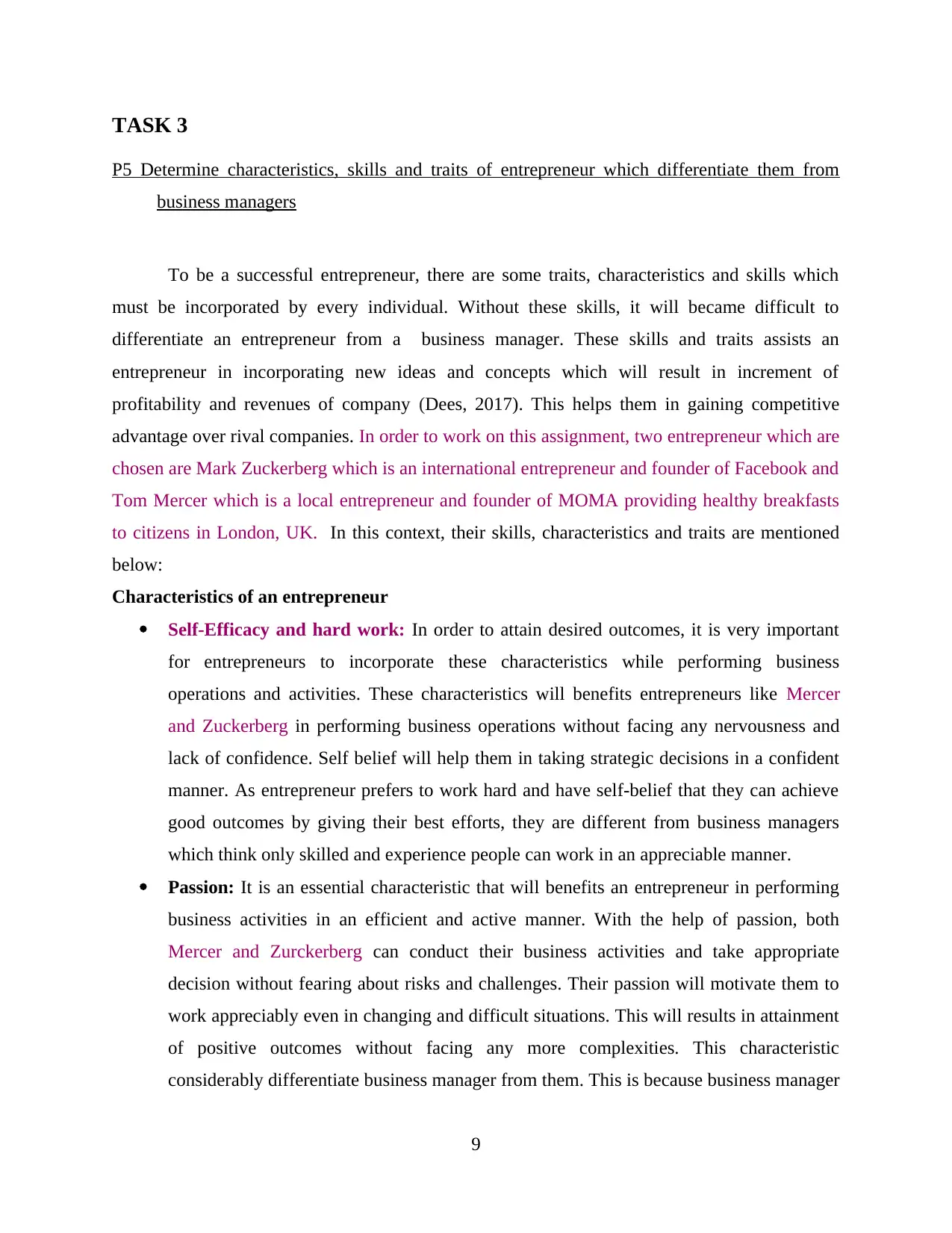
TASK 3
P5 Determine characteristics, skills and traits of entrepreneur which differentiate them from
business managers
To be a successful entrepreneur, there are some traits, characteristics and skills which
must be incorporated by every individual. Without these skills, it will became difficult to
differentiate an entrepreneur from a business manager. These skills and traits assists an
entrepreneur in incorporating new ideas and concepts which will result in increment of
profitability and revenues of company (Dees, 2017). This helps them in gaining competitive
advantage over rival companies. In order to work on this assignment, two entrepreneur which are
chosen are Mark Zuckerberg which is an international entrepreneur and founder of Facebook and
Tom Mercer which is a local entrepreneur and founder of MOMA providing healthy breakfasts
to citizens in London, UK. In this context, their skills, characteristics and traits are mentioned
below:
Characteristics of an entrepreneur
Self-Efficacy and hard work: In order to attain desired outcomes, it is very important
for entrepreneurs to incorporate these characteristics while performing business
operations and activities. These characteristics will benefits entrepreneurs like Mercer
and Zuckerberg in performing business operations without facing any nervousness and
lack of confidence. Self belief will help them in taking strategic decisions in a confident
manner. As entrepreneur prefers to work hard and have self-belief that they can achieve
good outcomes by giving their best efforts, they are different from business managers
which think only skilled and experience people can work in an appreciable manner.
Passion: It is an essential characteristic that will benefits an entrepreneur in performing
business activities in an efficient and active manner. With the help of passion, both
Mercer and Zurckerberg can conduct their business activities and take appropriate
decision without fearing about risks and challenges. Their passion will motivate them to
work appreciably even in changing and difficult situations. This will results in attainment
of positive outcomes without facing any more complexities. This characteristic
considerably differentiate business manager from them. This is because business manager
9
P5 Determine characteristics, skills and traits of entrepreneur which differentiate them from
business managers
To be a successful entrepreneur, there are some traits, characteristics and skills which
must be incorporated by every individual. Without these skills, it will became difficult to
differentiate an entrepreneur from a business manager. These skills and traits assists an
entrepreneur in incorporating new ideas and concepts which will result in increment of
profitability and revenues of company (Dees, 2017). This helps them in gaining competitive
advantage over rival companies. In order to work on this assignment, two entrepreneur which are
chosen are Mark Zuckerberg which is an international entrepreneur and founder of Facebook and
Tom Mercer which is a local entrepreneur and founder of MOMA providing healthy breakfasts
to citizens in London, UK. In this context, their skills, characteristics and traits are mentioned
below:
Characteristics of an entrepreneur
Self-Efficacy and hard work: In order to attain desired outcomes, it is very important
for entrepreneurs to incorporate these characteristics while performing business
operations and activities. These characteristics will benefits entrepreneurs like Mercer
and Zuckerberg in performing business operations without facing any nervousness and
lack of confidence. Self belief will help them in taking strategic decisions in a confident
manner. As entrepreneur prefers to work hard and have self-belief that they can achieve
good outcomes by giving their best efforts, they are different from business managers
which think only skilled and experience people can work in an appreciable manner.
Passion: It is an essential characteristic that will benefits an entrepreneur in performing
business activities in an efficient and active manner. With the help of passion, both
Mercer and Zurckerberg can conduct their business activities and take appropriate
decision without fearing about risks and challenges. Their passion will motivate them to
work appreciably even in changing and difficult situations. This will results in attainment
of positive outcomes without facing any more complexities. This characteristic
considerably differentiate business manager from them. This is because business manager
9
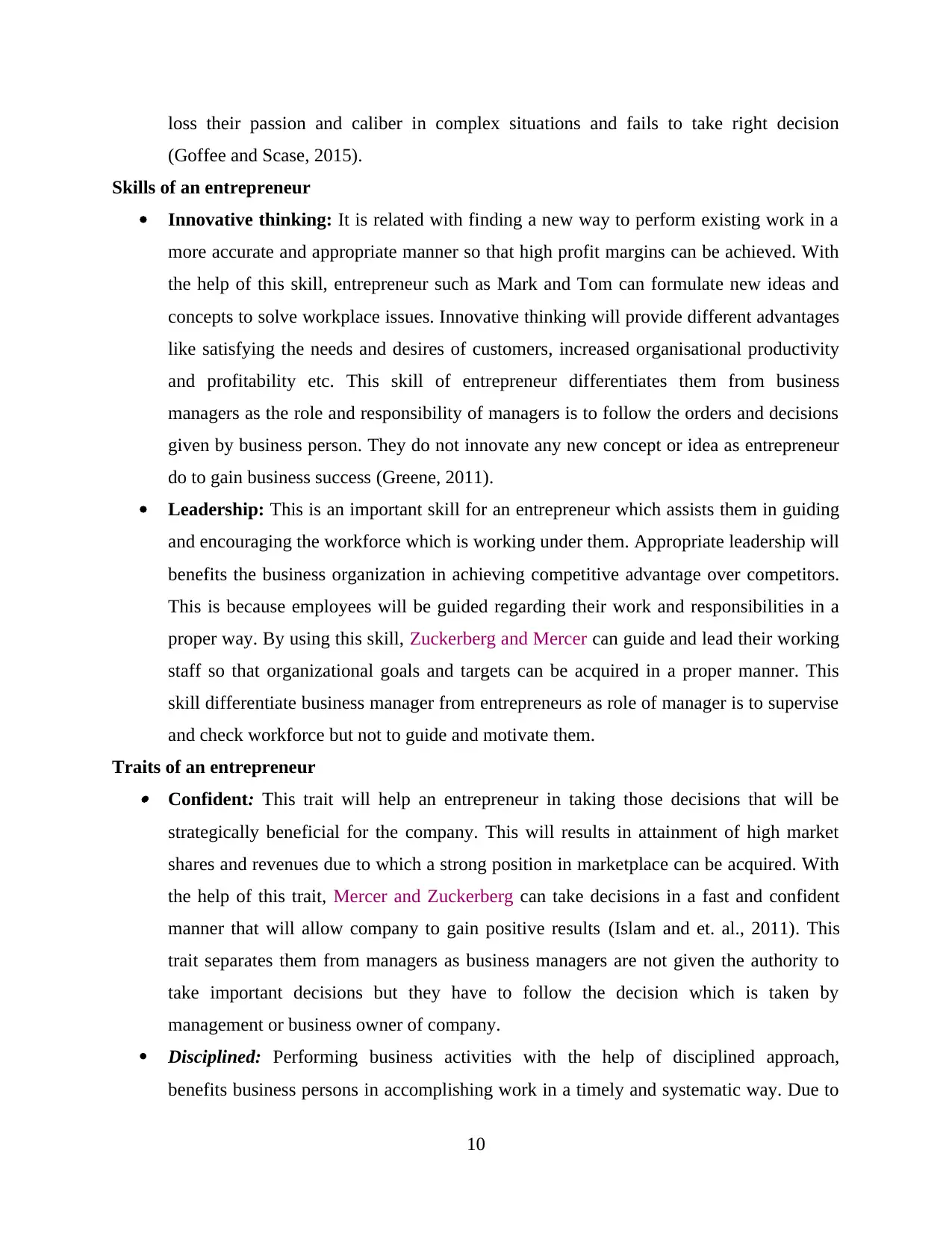
loss their passion and caliber in complex situations and fails to take right decision
(Goffee and Scase, 2015).
Skills of an entrepreneur
Innovative thinking: It is related with finding a new way to perform existing work in a
more accurate and appropriate manner so that high profit margins can be achieved. With
the help of this skill, entrepreneur such as Mark and Tom can formulate new ideas and
concepts to solve workplace issues. Innovative thinking will provide different advantages
like satisfying the needs and desires of customers, increased organisational productivity
and profitability etc. This skill of entrepreneur differentiates them from business
managers as the role and responsibility of managers is to follow the orders and decisions
given by business person. They do not innovate any new concept or idea as entrepreneur
do to gain business success (Greene, 2011).
Leadership: This is an important skill for an entrepreneur which assists them in guiding
and encouraging the workforce which is working under them. Appropriate leadership will
benefits the business organization in achieving competitive advantage over competitors.
This is because employees will be guided regarding their work and responsibilities in a
proper way. By using this skill, Zuckerberg and Mercer can guide and lead their working
staff so that organizational goals and targets can be acquired in a proper manner. This
skill differentiate business manager from entrepreneurs as role of manager is to supervise
and check workforce but not to guide and motivate them.
Traits of an entrepreneur Confident: This trait will help an entrepreneur in taking those decisions that will be
strategically beneficial for the company. This will results in attainment of high market
shares and revenues due to which a strong position in marketplace can be acquired. With
the help of this trait, Mercer and Zuckerberg can take decisions in a fast and confident
manner that will allow company to gain positive results (Islam and et. al., 2011). This
trait separates them from managers as business managers are not given the authority to
take important decisions but they have to follow the decision which is taken by
management or business owner of company.
Disciplined: Performing business activities with the help of disciplined approach,
benefits business persons in accomplishing work in a timely and systematic way. Due to
10
(Goffee and Scase, 2015).
Skills of an entrepreneur
Innovative thinking: It is related with finding a new way to perform existing work in a
more accurate and appropriate manner so that high profit margins can be achieved. With
the help of this skill, entrepreneur such as Mark and Tom can formulate new ideas and
concepts to solve workplace issues. Innovative thinking will provide different advantages
like satisfying the needs and desires of customers, increased organisational productivity
and profitability etc. This skill of entrepreneur differentiates them from business
managers as the role and responsibility of managers is to follow the orders and decisions
given by business person. They do not innovate any new concept or idea as entrepreneur
do to gain business success (Greene, 2011).
Leadership: This is an important skill for an entrepreneur which assists them in guiding
and encouraging the workforce which is working under them. Appropriate leadership will
benefits the business organization in achieving competitive advantage over competitors.
This is because employees will be guided regarding their work and responsibilities in a
proper way. By using this skill, Zuckerberg and Mercer can guide and lead their working
staff so that organizational goals and targets can be acquired in a proper manner. This
skill differentiate business manager from entrepreneurs as role of manager is to supervise
and check workforce but not to guide and motivate them.
Traits of an entrepreneur Confident: This trait will help an entrepreneur in taking those decisions that will be
strategically beneficial for the company. This will results in attainment of high market
shares and revenues due to which a strong position in marketplace can be acquired. With
the help of this trait, Mercer and Zuckerberg can take decisions in a fast and confident
manner that will allow company to gain positive results (Islam and et. al., 2011). This
trait separates them from managers as business managers are not given the authority to
take important decisions but they have to follow the decision which is taken by
management or business owner of company.
Disciplined: Performing business activities with the help of disciplined approach,
benefits business persons in accomplishing work in a timely and systematic way. Due to
10
⊘ This is a preview!⊘
Do you want full access?
Subscribe today to unlock all pages.

Trusted by 1+ million students worldwide
1 out of 17
Related Documents
Your All-in-One AI-Powered Toolkit for Academic Success.
+13062052269
info@desklib.com
Available 24*7 on WhatsApp / Email
![[object Object]](/_next/static/media/star-bottom.7253800d.svg)
Unlock your academic potential
Copyright © 2020–2026 A2Z Services. All Rights Reserved. Developed and managed by ZUCOL.





